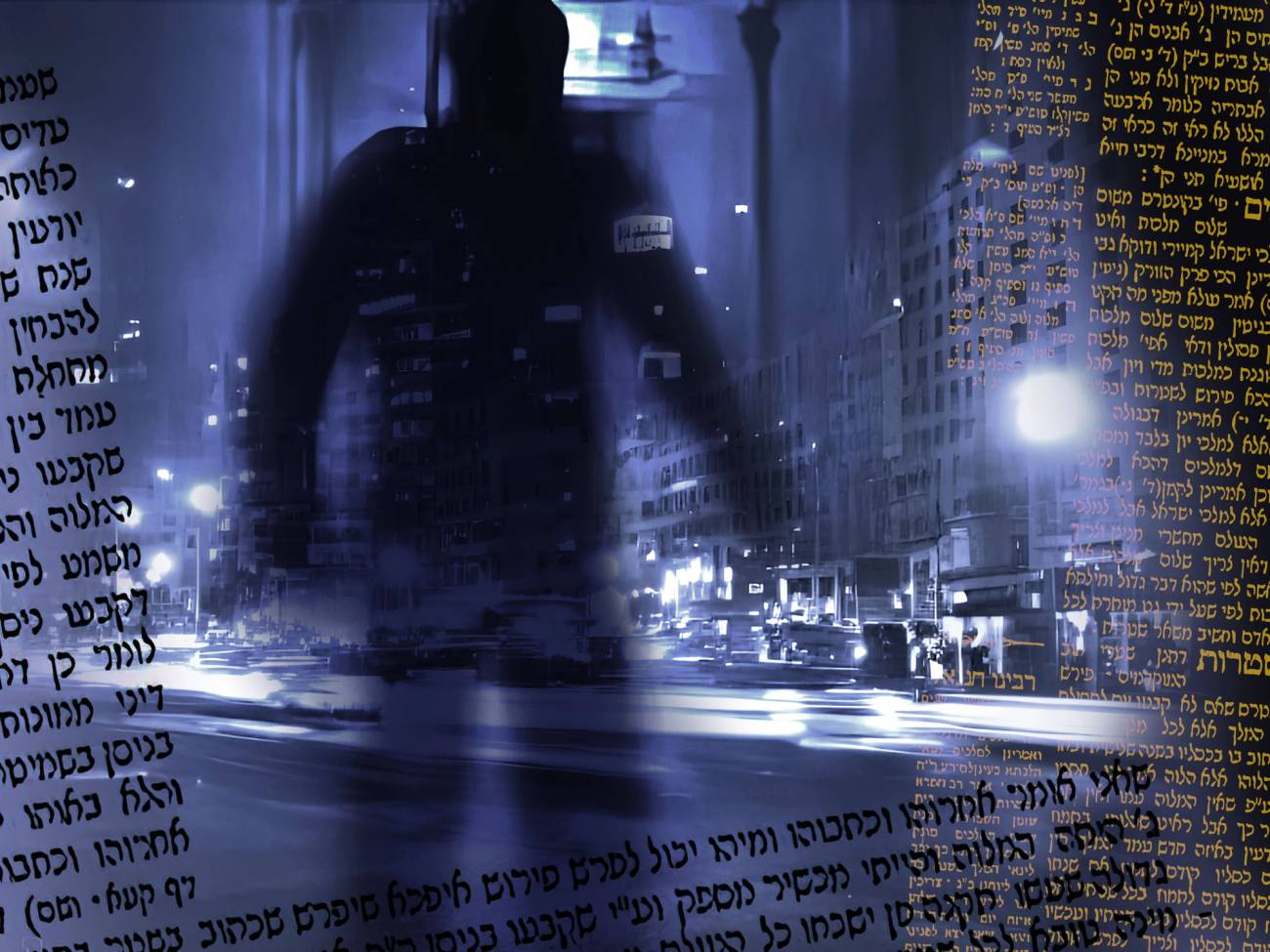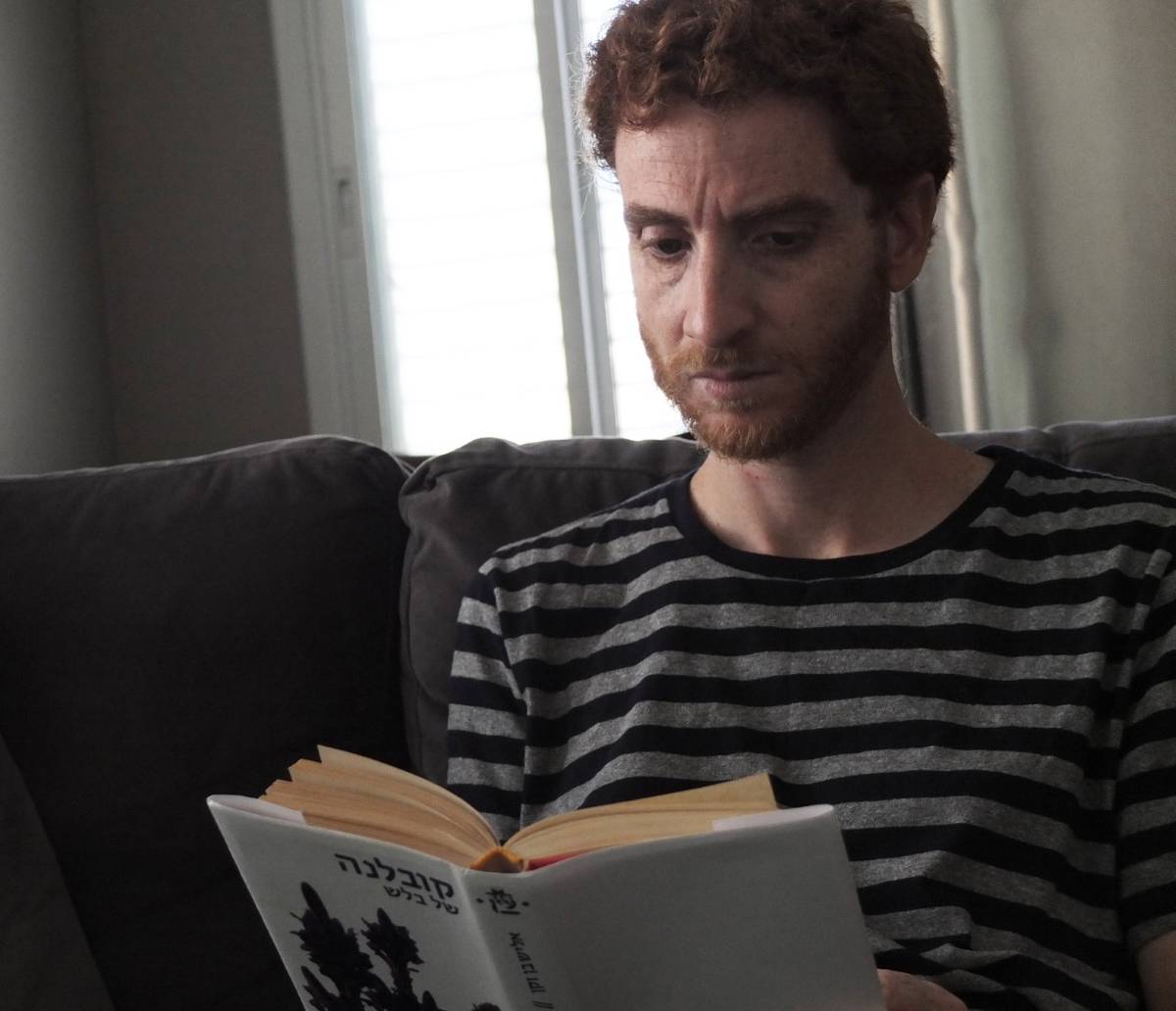The Detective-Philosopher of Sderot
A newly completed trilogy of detective novels merges murder mysteries with Talmudic introspection



Big cities are only as great as the newcomers who come to live in them, dreaming their way to a cosmopolitan life. Each dream is as large as the wound of not belonging, of fighting hard to fit in. Driven by yearning and resentment in equal measure, these newcomers are often unaware of the originality and wisdom they possess, the kind of originality and wisdom that belong only to those who are nurtured by the periphery.
The heart of Shimon Adaf’s Lost Detective trilogy, translated by Yardenne Greenspan and published by Farrar, Straus and Giroux in August, is an homage to newcomers. The trilogy tells the story of the small, southern Israeli town of Sderot, and those few of its inhabitants who made their way to Tel Aviv. While written as a fast-paced detective story, Adaf’s work is filled with profound political and social commentary, poetics and film criticism, and lyrical writing about music. The trilogy’s first volume, One Mile and Two Days Before Sunset, unfolds like a traditional murder mystery until the final moment, when it implodes with an unresolvable ethical question. It is not the kind of question that one normally encounters in a genre novel, but rather an unresolvable dilemma of the sort we might find in the Talmud, the echoes of which permeate Adaf’s writing.
The protagonist of the trilogy, Elish Ben Zaken, is an old soul with more than a few past lives under his belt. Although he grew up in Sderot, he now seems inseparable from his life in Tel Aviv. A onetime brilliant rock music critic and freelance philosopher-academic, he now works as a private detective. He is brilliant, deeply original, and very funny, but also awkward, grumpy, and misanthropic. At one point, Elish casually alludes to the link between him and the Talmudic character Elisha Ben Abuya, also known as the Aher, or the heretic. It is clear that Elish comes from a religious background but now lives a different life, in terms of both observance and politics, and it is the source of endless bickering between him and his Sderot family, who are immigrants from Morocco. Though this isn’t always explicitly stated, all of the important characters in the book are Mizrahi as well—a subtle but crucial fact that underlies the book’s theme of class and social struggle.
Dalia Shushan, the muse and absent protagonist of the trilogy, is a revered but psychologically scarred rock singer who is murdered on the Ninth of Av—the day the Jewish calendar associates with destruction, and the time of mourning of the two Jerusalem Temples. Like Elish, Dalia, too, comes from a working-class family in Sderot. She is intellectual, unpredictable, and eccentric, and is at the same time deeply admired and little understood by those around her. Her murder is confounding: The public narrative around it is just too random and meaningless, and it haunts Elish long past the first book’s seeming resolution.
“Formal perfection,” Elish tells a friend at one point, “has always been the refuge of those who lack artistic sense.” Like so many other similar comments in the book, the remark fits neatly into the plot and dialogue at hand, but it is also a meta-comment. Elish’s point obliquely refers to the way One Mile and Two Days Before Sunset is written: This novel follows the classic detective form, but only to a point—its perfection is not in the form but in the form’s abandonment.

“Literature must be anti-formulaic because life is anti-formulaic,” Adaf told me when we spoke in an interview over Zoom. As for the detective novel, Adaf went on, its essence may be the “search for knowledge in its purest form.” But, he added, “it also allows you to ask questions about the nature of the desire to know, and where that leads you. Sometimes it leads you to beautiful places and sometimes to very intimidating places within yourself and the world. And it also shows you the limits of your mental capacity. It’s not transcendence of the detective novel but its destruction that allows you to destroy and construct the story itself.”
Indeed, One Mile and Two Days Before Sunset is constructed to hold the weight of its endless questions and paradoxes. It isn’t merely Dalia’s death, but also her music that seems to evade the reader’s grasp: “The high pitch of the guitar—a single note, clean for half a minute before drowning in distortion—and the flute—a fraction late—and the entrance of acoustic guitar, and the violin … a non-loop loop, a broken universe of sound. Dalia Shushan’s voice cracked at the edges of the high range, scattering in the low range, but always clear. When the singing was over, an instrumental segment erupted—wind instruments spinning into each other, swallowing the flute and the violin.”
This is the sort of writing that doesn’t merely describe music but pushes the imagery and punctuation into a highly poetic, hypnotic language. We are in the realm of intimate understanding of the instruments’ emotional weight. When I asked Adaf about what he envisioned for Dalia’s band, Blasé and San Lumière, he said he imagined “Portishead playbacks … but with the voice of [the legendary Egyptian singer] Umm Kulthum, a voice flowing from another dimension.”
After the trilogy’s publication in Hebrew, Adaf collaborated with a number of contemporary Israeli musicians to record Entire Mythology Beneath My Fingernail, an album that sets Dalia’s lyrics, which appear in the book, to music. While a terrific listen, the album only further upholds the mythic status of Dalia’s craft. The Entire Mythology is presented as a collection of “covers”—yet the original versions do not really exist, but are only mentioned, briefly, throughout the book. In other words, the original sound of Blasé and San Lumière exist in the reader’s imagination only.
Similarly, there is a lot that is unclear about Elish himself. While there are occasional references to his personal life, which bears signs of trauma, it is never quite explained why and how he becomes a private detective. Elish seems aware of this, and begrudgingly tackles his own “case,” knowing only that its key has something to do with the town of Sderot, where he grew up. Adaf, recalling his own life in this peripheral town, pointed out: “The story of Sderot is the story of Moroccan Jews in Israel. It was the epitome of a poor, crime-ridden, morally suspect place ... But the ’80s were the decade when things started to change, with TV and filming crews coming to Sderot, and we as children started to see ourselves as reflected from the outside, in addition to what we knew about our parents and their past. Ironically, as children, we started to believe that we were real people because we were on TV.”
Perhaps this is what “existence” itself hinges on in our times: the fact that our identity is affirmed by the extent of its visibility in the media. And to be an underrepresented minority from the province is to seek that affirmation. Adaf further explained that in the ’90s, Sderot changed yet again: “There was a cultural explosion … lots of bands practicing in bomb shelters, and there were other artists, too, painters and movie makers. Everybody I knew, or started to get to know, were artists by definition, artists by destiny. And as these artists started to get attention, Sderot was being called Israeli Liverpool or Israeli Manchester.”
The heyday of Sderot ended with Gaza’s rocket fire when the town became, as Adaf told me, “nothing but a military metaphor for the thing that needs to be defended.” Being close to the border, though, was not the only danger in a town on the periphery. Adaf further elaborated that one of the reasons why so many young Mizrahi people of his generation from Sderot became artists—the same reason Dalia Shushan became a musician—had to do with “living in a split reality, conflicted reality. This is what happened to our generation, which inherited mixed feelings our parents had towards Israel: On the one hand, they wanted to be a part of it, on the other hand they felt abandoned by it, considered second-class citizens. They were broken, they were voiceless, and yet couldn’t articulate the protest because the temptation of Israel was so great. Its [Western rather than North African] music and the books were like light to us.” He added that creating a bridge between European and European-influenced literature as well as the music he discovered and came to love, and the world of his parents became crucially important to him, “so they wouldn’t be strangers in my world. And the way to connect the two was through art, because art is a way to put together incompatible things.”
Although the Lost Detective trilogy is Adaf’s first prose collection to be translated into English, and his first book with a major American publisher, he has long been a revered figure in Israel: a poet, novelist, essayist and musician, and the recipient of Israel’s most prestigious literary awards. Adaf’s first book, which was also translated into English, is Aviva-No, a book of elegies for his sister, beautiful and heartbroken poems, marked by experimental inventiveness. It is almost impossible to believe that the same author could write such stylistically divergent works.
Then again, One Mile and Two Days Before Sunset is unlike any other murder mystery. Even the following volumes, A Detective’s Complaint and Take Up and Read, are not really sequels, but hermeneutic, interpretive explorations of the world the original volume sets out to present. “Detective fiction is meta-fiction all the time,” Adaf told me, adding: “It’s fiction about how to tell a story … a detective is a storyteller, connecting pieces from everywhere, and saying ‘this is the story.’” Perhaps the same can be said of a historian and a poet, attempting to tell the story of his province, and his community, and their joint future together, proceeding through experience and memory, until the narrative finally faces its most existential questions, the sort of questions that cannot be answered but are the very reason we read literature.
Jake Marmer is Tablet’s poetry critic. He is the author of Cosmic Diaspora (2020), The Neighbor Out of Sound (2018) and Jazz Talmud (2012). He has also released two jazz-klezmer-poetry records: Purple Tentacles of Thought and Desire (2020, with Cosmic Diaspora Trio), and Hermeneutic Stomp (2013).